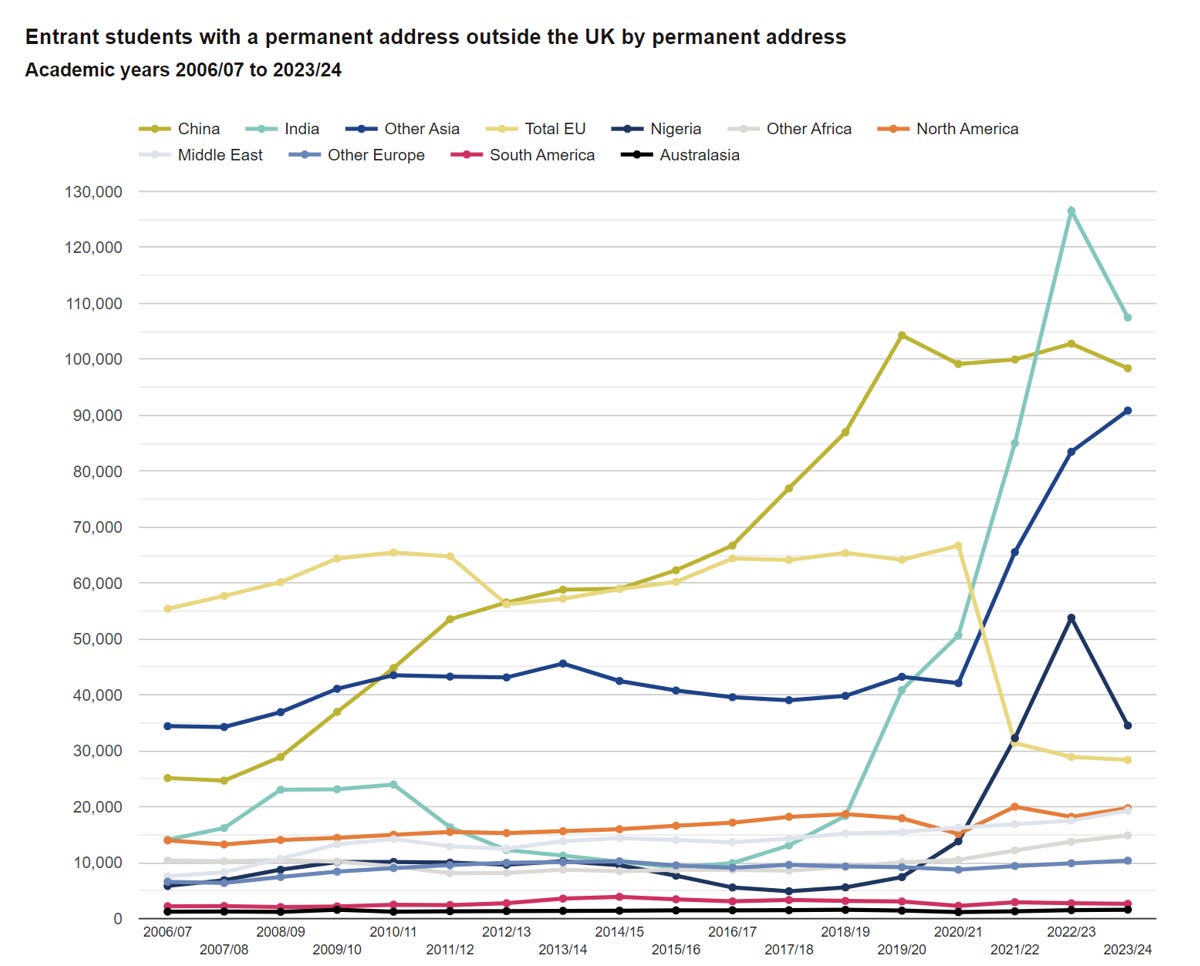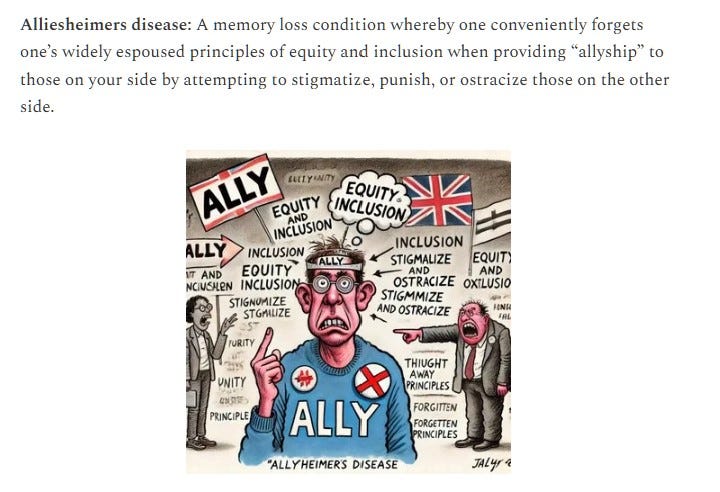Amusingly, perhaps, I am posting this guest essay on UK academia from … London, which was, for me, a three day stop on the way to Visegrad, Hungary (Danube resort town 45 minutes outside of Budapest) for a conference where I will be presenting the research that was the basis for these three Unsafe Science entries: botification, civic disalignment, permission structures for political murder).1 I do not usually write much about academia outside the U.S. because I don’t have the depth of knowledge and facts-at-my-fingertips that I have about the U.S. academy. So, without futher ado, I turn this entry over to someone who does.
Darren Gee is London-born and based writer who directly experienced how identity politics was forced into higher education as a student in the 2010s. He now works in higher education where he has seen the ossification of this ideological leaning as a requisite element of core curriculums across virtually all disciplines. His articles have been published by The Daily Sceptic and Academics for Academic Freedom (AFAF), and you can follow him on Substack.
There is an increasingly palpable sentiment that the elite educational institutions across the Western world are changing, and not for the better. Still, the reputations of Oxford and Cambridge retain a veneer of exceptional knowledge-creation based in their high educational standards, merit-based admission of students, and the collective genius of historic alumni. The binary star-system of elite British education - often merged in the ‘Oxbridge’ portmanteau - is comparable only to the prestigious Ivy League group of Universities in the United States.
But as these world-class institutions remain mired in controversy, having become germinal hotbeds for progressive activist protest movements, there is a growing recognition that the Cambridge of Bertrand Russell is not the Cambridge of Palestine Action, the Oxford of Riz Possnett no longer the Oxford of John Ruskin. Confidence in these institutions has plummeted as standards for quality and excellence have slowly been eroded, all whilst academic freedom steadily declines with the UK now holding the 64th position in world ranking.
Wards of the State
British Universities have increasingly resembled quangocracies (essentially British NGOs), having become helpless hosts of a parasitic and bloated state. At the behest of successive governments wielding the extensive powers of the Office for Students, Universities have swapped academic selection for Diversity, Equity & Inclusion (DEI) practices, whilst trading academic rigor for a student-as-consumer model. Drunk off inflated international admission fees paid by an infinite reservoir of Chinese and Indian foreign students, our Universities have lost their way; they can no longer be fairly compared to the institutions they once were despite retaining the international prestige that their historic reputations bring.

The mark of having been ‘educated’ in one of our Higher Education Institutions (HEIs) can be identified by a myriad of jargonistic buzz-concepts. The mandatory embedding of DEI (often re-ordered as EDI in Britain) across degree-level curriculums has produced graduates equipped with concepts of ‘decoloniality’, ‘feminist, gender, queer, and trans theory’, analyses of ‘whiteness’ or ‘blackness’, and consideration of a ‘global majority’ in all subject fields; from history to law, and increasingly in the scientific domain. Meanwhile, elite Universities are brazenly screening aspiring faculty by requiring that they profess their ideological commitment in the application process. In the alarming case of Oxford University, applicants were asked to submit “evidence of interest and effectiveness in promoting a culture of equality and diversity in the workplace”. This principle is applied at all levels of the educational sector. With a budget totalling more than £7 billion, government funding of academic research hinges upon a clear demonstration of ideological allegiance; a practice clearly designed to impose a chilling effect on research and the projects researchers consider worthy of pursuit. Shockingly, there are now efforts to implement this model across all public funding of British Universities. This proposal means that a University can be defunded if it does not meet the constantly-morphing chameleonic demands of diversity & inclusion.
Reform & DOGE UK
In contrast to the United States, where the White House has shown that it is willing to confront the activist-radicalism operating on some elite campuses, these practices are in ascendancy in Britain. The ‘vibe-shift’ in American politics has injected a direly-needed dose of optimism across the pond, signalling that reform is indeed possible and that British politics need not be limited to a sclerosis of the ‘uniparty’. Nigel Farage has propelled Reform UK to unparallelled popularity, all whilst DOGE UK is in its formative stages and The Procurement Files unearths a trend eerily mirroring DOGE US’s discoveries from its investigation into USAID. Meanwhile, a surprise decision by the Office for Students found that the University of Sussex had acted to curb the academic freedom of one of its Professors of philosophy, Kathleen Stock (typically referred to as a trans-exclusionary radical feminist i.e. TERF), resulting in an unprecedented £585,000 fine. The decision in March 2025 seemed to foreshadow the UK Supreme Court’s ruling that the concept of sex is binary, dramatically redeeming Professor Stock’s ‘gender-critical’ beliefs. Unsurprisingly, with heels dug in, the University of Sussex recognised no error on its part, stating that the ruling will only harm the ‘diversity & vibrancy’ of British Universities.

Managed Decline vs. Reform for Excellence
If managed decline is to be swapped for the optimism of change, it would take an unparalleled revision of the aims of various non-departmental public bodies (NDPBs – a newly sanitised classification for Quangos), such as the Office for Students, UK Research and Innovation (UKRI), and its subordinate research councils. The restoration of British educational excellence relies upon the rediscovery of its foundational principles: genuine academic freedom can only flourish when researchers are not cowed from subjects due to restrictive funding practices, and only when aspiring faculty are hired on the basis of merit, not ideological leaning, can true viewpoint diversity exist.
Admittedly, this seems a gargantuan task, but these public bodies remain under the authority of Parliament and a willing government would have the legal ability and democratic mandate to enact the necessary reforms. A ‘bonfire of the quangos’ has been the intention of all governments in recent memory, with both Labour and Reform UK now having announced their intention to cut government spending and ‘de-bureaucratise’ decision-making. Only Reform UK, however, have expressly stated their opposition to the entrenchment of DEI in public bodies, and their recent local election wins have jolted factions within Labour to follow suit. We are perched atop a tide which may be turning. But if politics is downstream of culture, then it faces an eleventh-hour upstream swim against the tide if we are to return our foundational Universities to their former prestige.

Commenting
Before commenting, please review my commenting guidelines. They will prevent your comments from being deleted. Here are the core ideas:
Don’t attack or insult the author or other commenters.
Stay relevant to the post.
Keep it short.
Do not dominate a comment thread.
Do not mindread, its a loser’s game.
Don’t tell me how to run Unsafe Science or what to post. (Guest essays are welcome and inquiries about doing one should be submitted by email).
Footnote
Stopping in London. First, having grown up a step or two above poor (city housing project, neither parent with degrees, my mom (who was way smarter than my dad, never even went to college, lived on my own since 19, etc.), that I have carved out a life where I can now do this sort of travel routinely (in part because it is partially or sometimes completely paid for because I am in demand as a speaker) never ceases to amaze me and be something for which I am eternally grateful. Still, it is very weird that there is no way to fly direct from any NYC airport to Budapest! So we have to do a layover. I hate layovers, so, rather than spending 20 hours one day traveling, we use the “must layover” problem to spend a few days in a European city from which we can then fly to Budapest. That is how we ended up in London.




Accurate summary of the collapse in quality. There are still very bright people and areas of first rate research, but there is now a long tail of feeble sanctimonious sermonising